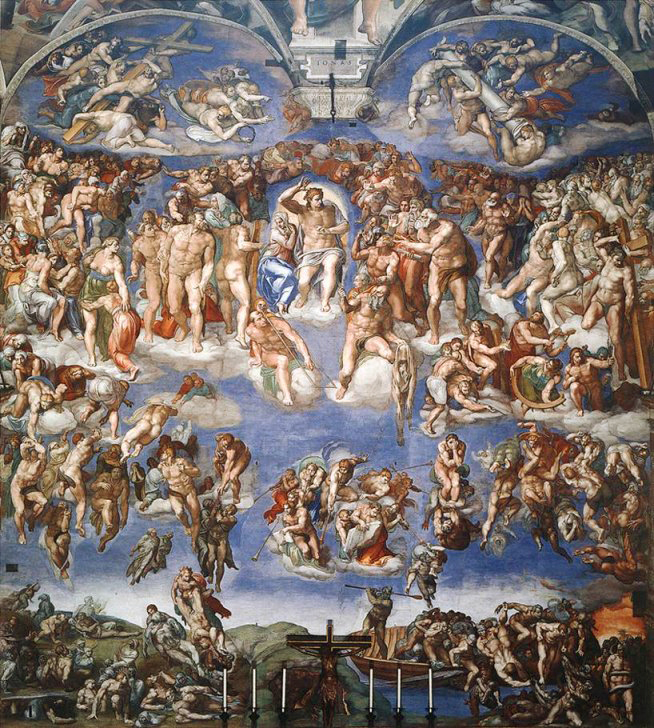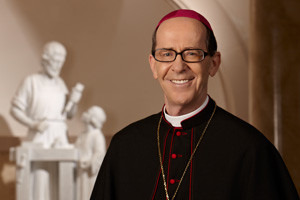
Four Last Things — Part 4: Judgment

A favorite Biblical image used by the Church Fathers to describe the fragility and complexity of human life is that of a potter working with clay. Making beautiful pottery out of clay can be tedious work, requiring much dedication and attention to details.
Our lives are similar to a lump of clay. We are shaped by the decisions we make in life. While we live, we are wet clay on the spinning wheel of time. As long as it is still moist, the clay can be shaped and reshaped until it becomes a beautiful vessel. However, once it is placed in the fire, its shape is fixed permanently. So it is with each of us. Once we die and are standing before God, our fundamental shape, that is our choice “for” Him or “against” Him, is fixed forever. The time for choosing good or evil ends at death because it is the time for judgment. “For we must all appear before the judgment seat of Christ, so that each one may receive good or evil, according to what he has done in the body” (2 Cor 5:10).
EN ESPAÑOL: Juicio, el Encuentro Final con la Verdad y el Amor
God’s Truth Will Prevail

When we speak of judgment as the second of the Four Last Things, it includes both the Particular and the General Judgment. The Particular Judgment happens immediately at the moment of death when the soul, now separated from the body, stands before God to give an account for the good that was done and for the sins that were committed. The Catechism of the Catholic Church describes this judgment as “the eternal retribution received by each soul at the very moment of death, in a particular judgment that refers his life to Christ: either entrance into the blessedness of Heaven — through purification or immediately, — or immediate and everlasting damnation” (CCC 1022).
The General Judgment, on the other hand, refers to the end of time, at Christ’s Second Coming, when all will be revealed, and the particular judgment of every soul will be ratified for all to see and to understand. Here again, the Catechism teaches that “in the presence of Christ, who is Truth itself, the truth of each man’s relationship with God will be laid bare. The Last Judgment will reveal even to its furthest consequences the good each person has done or failed to do during his earthly life” (CCC 1039). The purpose of the General Judgment is to reveal how the way we lived affected others; thus, we will come to understand the ultimate significance of our moral acts.
As mentioned previously in this series, death is real and inevitable. When we reflect on judgment as equally real and inevitable, we come to understand in depth the reality of sin and its eternal consequences.

The secular society in which we live has lost touch with this eternal reality called judgment. In the world today, sin is minimized or declared of little significance. Many seek comfort in the convenient belief that most — if not all — people will go to Heaven when they die. Forgetting that there will be a judgment shows that we are losing touch with the realities and consequences of our lives and with the reason for our existence.
The 19th-century philosopher, Søren Kierkegaard, already detected this symptom in his time, “The beyond and, with it, the judgment has become a joke, something so uncertain that one is amused to think that there was a time in which this idea transformed the whole of human existence.” Human life without this judgment from God would be incomplete and meaningless. If there were no judgment, what would distinguish evildoers from their victims?
Our particular judgment is necessary if our lives are to have meaning and if our sufferings are not to be in vain. However, as amazing as it is, too few people seriously prepare for death and judgment. Many of us, even we who love Jesus, find ourselves pursuing the things that tend to consume our daily lives such as career, money, power and possessions while giving death and judgment little attention. Death and judgment, however, are real events; they are going to happen whether we are prepared for them or not.
Throughout the Gospels, Jesus urgently warns us to be ready for judgment. He does this in many ways, but mostly through parables, which powerfully portray the drama of human life, the need to make decisions and the consequences of the decisions. They tell us that everything we do in life, as well as things we leave undone, have eternal consequences. The choices we make each day determine and point to a destiny, for they bring blessing or curse, salvation or condemnation.
It All Comes Down To Love
While the thought of death and judgment shouldn’t destroy our inner peace or undercut our trust in God, a sense of urgency should animate us in striving for salvation. To prepare for death, how can we know the criteria by which we will be judged? To this important question, St. John of the Cross replied, “In the twilight of life, God will not judge us on our earthly possessions and human successes, but on how well we have loved.” When we find ourselves face to face with God, He won’t ask us how much wealth we have accumulated, how many professional titles we obtained or how many properties we bought. God will ask us how much we have loved Him and others.
This important aspect of God’s judgment is referred to many times in the Sacred Scriptures but never so clearly drawn out as in Jesus’ Parable of the Sheep and the Goats (Mt 25:31-46). The sole criterion by which souls are categorized is whether or not they were generous, loving and kind. The interesting detail about this parable is that both groups, the good and the wicked, were surprised at the judgment that was dealt to them. The just were surprised to hear themselves being praised. They simply believed it was important always to act kindly toward those less fortunate than themselves. Those who were condemned were no less astonished at their sentence. They appeal to their “good” conduct: they have not lied, murdered, stolen or committed adultery. As far as they know, they have kept all the commandments. However, they had neglected to do the good that love required of them. In the presence of suffering, they heartlessly did nothing. Their sins were not of commission but omission.
Most of the commandments are expressed with “Thou shalt not’s”. But, these are included and superseded in the two Great Commandments of Jesus: “You shall love the Lord, your God, with all your heart, with all your being, with all your strength, and with all your mind, and your neighbor as yourself” (Lk 10:27). These commandments require the interior disposition that compels outward actions of love. In the Parable of Judgment, we see how these two commandments, these two loves, are really one. Jesus makes it clear that loving God with our whole heart is expressed in loving our neighbor as ourselves. So, whenever we strive to love our neighbor in this way, we are loving God Himself.
So, ultimately, judgment will be simple; it all comes down to love. Love is the one thing that gives meaning to our existence; love is also the fruit of our Redemption and love is the subject on which we all will be judged. When we look at our whole life through the lens of faith, we see with clarity why God created us: to love and be loved by Him, and to enjoy eternal happiness in His Presence. When we live with this focus, everything else is secondary to love. Nothing else ever satisfies and nothing will, except love.
Therefore, the whole purpose in life is to seek Christ, who is Love. When we give ourselves totally to Him, we find that love is a Person. If we live our life focused on the love of Christ, then our attitude before God’s judgment will not be one of fear but one of hope sustained by love. As St. Paul reminds us, “The one who judges me is the Lord” (1 Cor 4:4). St. Teresa of Ávila put it this way: “For it will be an ineffable source of assurance to us at the hour of death to realize that we are going to be judged by Him Whom we have loved above all else.”
Let our lives be so dedicated to the love of Christ that, at our final judgment, we may hear His consoling words: “Come, you who are blessed by my Father. Inherit the kingdom prepared for you since the foundation of the world” (Mt 25:34).





